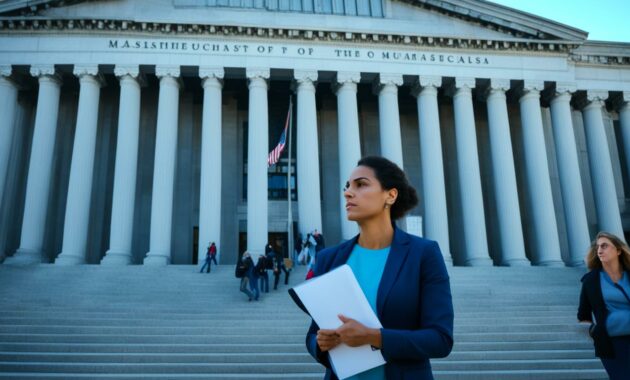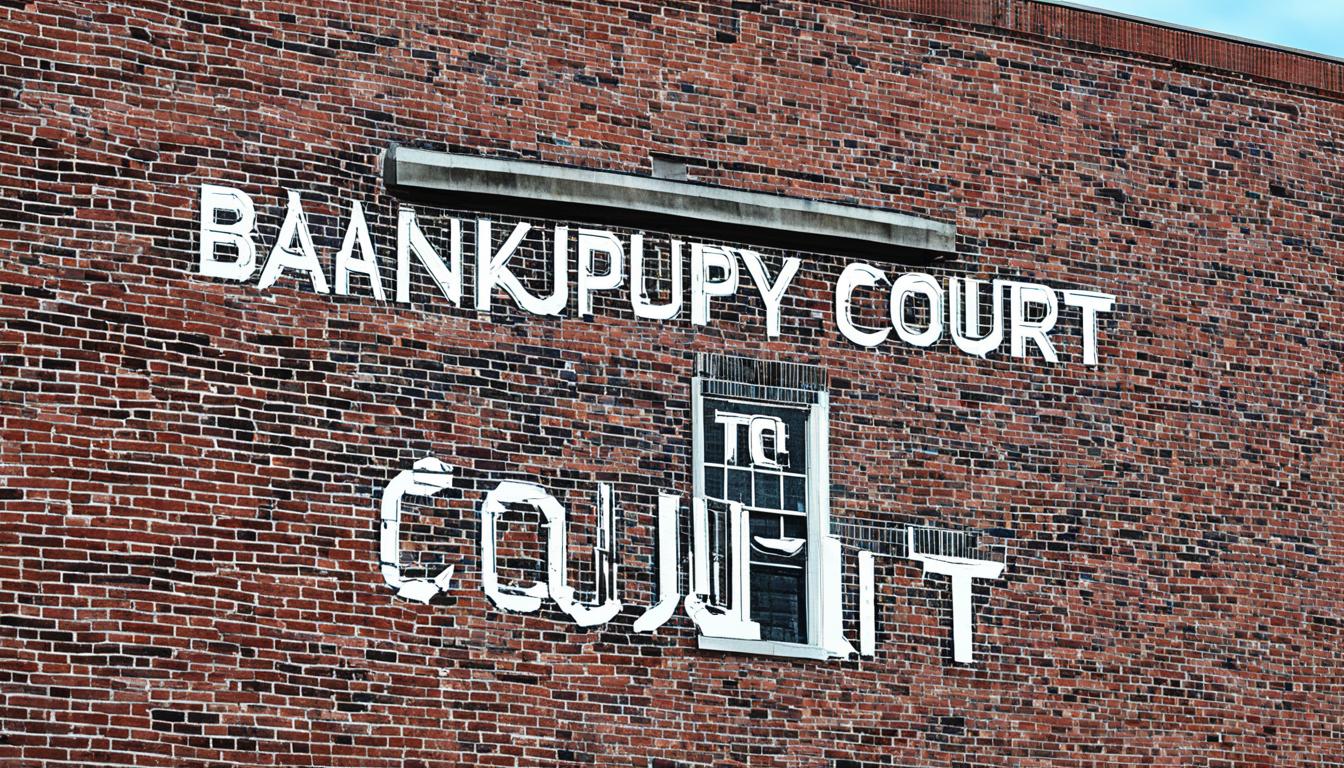Filing for bankruptcy in Massachusetts might seem hard, but this guide makes it easy. It explains the types of bankruptcy, who can file, and how the process works. You’ll also discover which of your belongings you can keep during bankruptcy. This info helps you understand your options clearly, whether you need to get rid of debt or start fresh.
Understanding Bankruptcy Basics in Massachusetts
In Massachusetts, bankruptcy can help those in financial trouble. The state offers Chapter 7 and Chapter 13 options. These types have their own rules and benefits, so knowing the difference is key.
Types of Bankruptcy: Chapter 7 vs. Chapter 13
Chapter 7 bankruptcy is called “liquidation” bankruptcy. It quickly forgives debts like credit cards and medical bills. But, to use Chapter 7, you must earn less than a certain amount.
Chapter 13 involves a payment plan over three to five years. It helps catch up on house or car payments. It can also protect more of what you own. This type might be better if you don’t qualify for Chapter 7.
Eligibility Requirements for Bankruptcy in Massachusetts
To file for bankruptcy in Massachusetts, you need to meet income and debt rules. A means test checks if you qualify for Chapter 7. Both chapters have debt limits. And there are certain waiting periods for filing again.
Knowing if you meet the bankruptcy criteria is vital. A bankruptcy lawyer can guide you. They’ll help you understand the complex rules, so you make the right choice.
“Bankruptcy is not something to be entered into lightly, but it can provide a fresh start for those who have found themselves in overwhelming financial situations.” – John Doe, Bankruptcy Attorney
Bankruptcy Court in MA: Procedures and Processes
Bankruptcy in Massachusetts has important steps and needs certain documents. First, individuals must fill out bankruptcy forms. They should also collect tax returns, pay stubs, and income proof. After this, they file a bankruptcy petition with the court.
Filing for Bankruptcy: Step-by-Step Guide
Here’s how to file for bankruptcy in Massachusetts:
- Collect financial docs like tax returns and pay stubs.
- Fill in required forms including the bankruptcy petition.
- Submit your petition to a bankruptcy court in Boston, Worcester, or Springfield.
- Answer the trustee’s financial questions at the creditor’s meeting.
- Take a credit counseling and a financial management class for Chapter 13.
- You might need to pay back some debts depending on your bankruptcy chapter.
Required Documents and Forms
For bankruptcy in Massachusetts, completing specific forms and providing documents is necessary. These include:
- Bankruptcy petition
- Bankruptcy schedules (A/B, C, D, E/F, G, H, I, and J)
- Statement of Financial Affairs
- Means test form (for Chapter 7 bankruptcy)
- Proof of income (like pay stubs and tax returns)
- Proof of any assets or property
- Proof of debts
In Massachusetts, Chapter 7 bankruptcy costs $306 to file, and Chapter 13 bankruptcy costs $281. After filing, a trustee manages your case. You must also go to a creditor’s meeting, where questions about your finances will be asked.

Bankruptcy Exemptions and Property Protection
In Massachusetts, when you file for bankruptcy, you can use state and federal exemptions for your assets. This includes protecting your home and car. Knowing these exemptions is key to keeping your important things safe during bankruptcy.
Massachusetts Homestead Exemption
You can use the Massachusetts homestead exemption to guard up to $125,000 in home equity. If you’ve filed a Declaration of Homestead, this amount jumps to $500,000. So, if your home’s equity is less than $125,000 ($500,000 with a Declaration), it’s safe from being sold in bankruptcy.
Massachusetts Motor Vehicle Exemption
With the motor vehicle exemption, you can protect $7,500 in equity in one car. If the car belongs to you and your spouse, the amount increases to $15,000. This helps keep a reliable car available, which is important after bankruptcy.
| Exemption | Amount |
|---|---|
| Massachusetts Homestead Exemption | Up to $125,000, or up to $500,000 with a Declaration of Homestead |
| Massachusetts Motor Vehicle Exemption | Up to $7,500 in equity in one vehicle, or up to $15,000 if owned jointly with spouse |
Knowing about these bankruptcy exemptions in Massachusetts helps protect what’s important. Getting advice from a massachusetts bankruptcy lawyer is wise. They can guide you to get the most from these exemptions for a smoother bankruptcy.

“Bankruptcy exemptions in Massachusetts can be a valuable tool in preserving your assets and securing a fresh financial start.”
Bankruptcy Court in MA: Locations and Resources
If you’re dealing with bankruptcy in Massachusetts, the courts are very important. The United States Bankruptcy Court in the state has three main locations. These are in Boston, Worcester, and Springfield.
The Boston Bankruptcy Court helps those from several counties. The Worcester Bankruptcy Court deals with cases from Worcester County. The Springfield Bankruptcy Court works with cases from four other counties.
On their websites, you’ll find lots of help during your bankruptcy. This includes details on how to file, who to talk to, and your rights. You’ll also learn about your options, like Chapter 7 or Chapter 13 bankruptcy.
There are also tips on filing, what things you can keep, and more. These can make the bankruptcy process clearer for you. It’s good to work closely with your bankruptcy lawyer too.
The Massachusetts bankruptcy courts aim to help you get a new financial start. They are ready to guide and support you, wherever you are in the state. You don’t have to face this alone. The courts are here for you.
Debt Discharge and Fresh Start After Bankruptcy
Filing for bankruptcy in Massachusetts lets people get rid of certain types of debt. It gives them a chance to start over financially. After a Chapter 13 bankruptcy, you can clear credit card debts, medical bills, and personal loans. This helps create a new beginning. Learn more about fresh start here
Types of Debts That Can Be Discharged
While bankruptcy helps get rid of many debts, some can’t be erased. Debts like child support, alimony, and recent tax obligations usually can’t be dropped. But, successfully making it through bankruptcy leaves you with a clean slate. This lets you build your credit again and start over financially.
| Dischargeable Debts | Non-Dischargeable Debts |
|---|---|
|
|
If you file for bankruptcy, you can take back control of your money. The skilled attorneys at [Law Firm Name] are ready to help. They’ll explain how you can get a bankruptcy discharge and start fresh.
“Bankruptcy was created in 1979 to help people make a fresh start. By finishing the process, you often cut down on your debt. This lets you fix your credit and step into a better financial future.”
Alternatives to Bankruptcy in Massachusetts
Bankruptcy can help those with a lot of debt. It’s good to know there are other choices in Massachusetts, too. You might consider debt consolidation, debt settlement, or working with a credit counseling group. These can be better than bankruptcy in some cases.
If you’re exploring options for debt relief in Massachusetts, make sure to think about the good and bad of each choice. Looking at other paths can find you a better way for your money. This can be a smart step without the tough parts of bankruptcy.
Remember, these other ways might not work for all. Talking to a money expert or a bankruptcy lawyer is smart. They can guide you and help make a choice that’s good for your future money plans.

